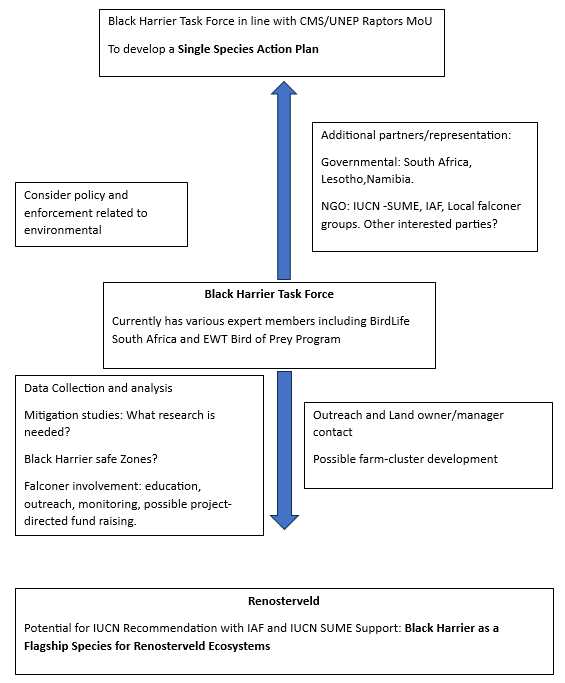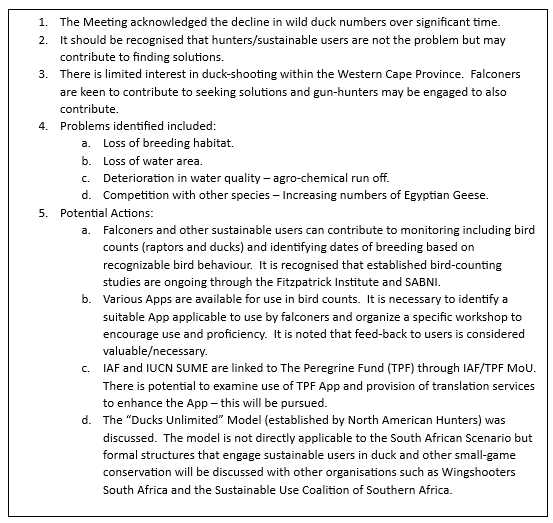Cape Town Meeting
Report on the Joint CEM-SUME – IAF Conference held in Cape Town, South Africa, from 24 th to 26 th June 2023.
The IUCN Commission for Ecosystem Management (CEM) Sustainable Use and Management of Ecosystems Thematic Group (SUME) and the International Association for Falconry and Conservation of Birds of Prey (IAF) held a joint conference in Cape Town to further the aims of the MoU signed between IUCN and IAF. The Conference was held over 3 days and involved formal presentations, a field trip and 2 targeted workshops. IUCN was represented by the regional Chair for CEM East and Southern Africa, Dr Joyce Jefwa, and Emeritus Member of the Commission, Prof. Robert Kenward. The principal organisations were partnered with the City of Cape Town and the Cape Falconry Club
to develop these objectives. BirdLife Zimbabwe and the CMS Memorandum of Understanding on the Conservation of Migratory Raptors in Africa and Eurasia (Raptors MoU) were also represented.
The Conference was held in the Smart Living Environmental Centre within the Greenpoint Eco-Garden and was kindly provided by the City of Cape town.
Day 1 (24 th June 2023) Chair: Cllr Frances Lombard – City of Cape Town.
The first day involved formal presentations with discussion on a series of topics relating to involvement of local communities in conservation and ecosystem conservation focusing on urban and agriculturally modified ecosystems.
The Meeting was opened by Cllr Aslam Cassiem, Chair of Spatial Planning and Environment Committee for the City of Cape Town who welcomed the participants.
The opening was followed by a virtual opening and greeting by Mark Upton, IAF Vice -President for Europe, Africa south of the Sahara and Eurasia.
Dr Adrian Lombard presented on the work of SUME Thematic Group and the role of the MoU between IAF and IUCN. The presentation was designed to introduce all participants to the organizations involved, including the role of CMS/UNEP Raptors MoU and to the significance of indigenous Peoples and Local Communities in the conservation effort.
Prof. Robert Kenward presented on Conservation Networking, in which he provided the background and overview of the development of multilingual portals for use in conservation projects with global-to-local and local-to-global communication. He showed the future potential, already in planning, to provide capability for geo-planning for conservation and biodiversity enhancement.
Dr Joyce Jefwa presented on the Sacred Kaya Forest Ecosystem Management for Biodiversity project established in Kenya with key involvement of local communities in rescuing a threatened ecosystem.
Cllr Alex Lansdowne of the City of Cape Town Wetlands and Waterways Committee presented on Water and Wetlands management within the urban ecosystem of the City of Cape Town and discussed the challenges and opportunities as well as the strategies undertaken by the city.
Ms. Khanyisile Ngaju, People and Conservation Officer in the City of Cape Town presented on living alongside wildlife within the city and explained the challenges and strategies developed to co-exist with baboons, caracals, otters, and porcupines (and people).
In the lunchbreak, Cllr Alex Lansdowne provided a guided walk through the Greenpoint Eco-Garden which would be preparatory to the field trip and introduction to the Renosterveld ecosystem. The
Western Cape of South Africa is well known for its floral diversity characterised by the Fynbos biome, but the threatened Renosterveld biome is equally significant, particularly from the point of view of biodiversity.
Steven Squires, farmer and Agricultural Economist, presented on How to Farm for Biodiversity, in which he explained how minor adjustments and tolerances allowed significant enhancement of
biodiversity if incorporated into the management of a significant commercial farm which provides food for 100,000 people and livelihoods for 10 families within the harsh interface between the karoo and sub-tropical biomes of South Africa.
Dr Neil Deacon, Chair of BirdLife Zimbabwe and falconer, presented on the role of falconers within conservation in Southern Africa and specifically in relation to the endangered Taita falcon. He emphasised the importance of their on-going involvement and significant role in monitoring and protecting the environment and biodiversity.
Gary Timbrell, CEO of the IAF, provided a virtual presentation on the global role of falconers in conservation, including their role within MEAs and IUCN as well as multiple national and species -
related projects and engagements.
The first day of the meeting was closed by Adrian Lombard who moderated two brief video-presentations. These demonstrated the devastation caused to raptors by electrocution in Asia and the massive effort to mitigate these, led by the Sheikh Mohammed bin Zayed Raptor Conservation Fund, with significant results in protecting raptors and other large perching birds.
Day 2 (25 th June 2023) Field Trip.
The Field Trip involved an excursion into the farmlands north of Cape Town.
We visited small (10 hectare) private nature reserve, enclosed within farmland. The reserve encloses an area of preserved renosterveld which has been set aside to protect an endangered
species of Geometric Tortoise. Cllr Alex Lansdowne and Glynn Alard led a guided tour within the renosterveld to demonstrate the incredible diversity of plans (approximately 700 species within the
enclosed area of which 70 species are endangered and occur in few other places), and the relationships between the plant species.
Members of the Cape Falconry Club flew falcons and explained the practice of falconry and the potential for this practice to benefit biodiversity within the environment. The flying was limited by
the inclement weather.
We then visited a small wine farm near the adjacent town of Wellington. The owner and winemaker, Dr Edmund Oettle, discussed the management of this organic farm and the benefits of
this to local biodiversity. This includes the re-discovery of a presumed-extinct fish species, the Berg River Red-Fin, which has been found on a small river on the farm where it survives because of the organic farming methods which result in low agricultural chemical run-off.
Day 3 (26 th June 2023) Chair: Cllr Frances Lombard and Facilitator: Dr Adrian Lombard.
Workshop 1: Conservation of the Black Harrier, Circus maurus, and the Renosterveld Ecosystem.
The Workshop was opened by a Statement from Dr Umberto Gallo-Orsi, Head CMS/UNEP Raptors MoU Coordination Unit in which he highlighted the Black Harrier as a species in Category 1 of the
Raptors MoU and the need for establishment of a Black Harrier Task Force in terms of the MoU and development of a Conservation Action Plan for the Species.
Dr Neil Deacon, who is a member of the Raptors MoU Technical Action Group, then described the function and processes of the MoU and relevance of the development of a conservation plan. It was noted that two of the Collaborating Partners to the MoU (IAF and IUCN CEM-SUME) were represented at the meeting.
Dr Odette Curtis, who leads the BirdLife (South Africa) Black Harrier Task Force and who is the Birdlife Champion for the species, then provided a presentation on the biology and conservation of this species as well as its relationship to the renosterveld biome which is also under significant threat. She explained the measures undertaken by her NGO (Overberg Renosterveld Conservation Trust), which strives to protect Renosterveld remnants within the Southern Cape wheatlands.
Prof Robert Kenward then discussed the possible role of Allee Effects in raptor conservation with insights from experiences with European Goshawk, European Buzzard, Hen Harrier and Red Kite.
There was active discussion following the presentations with a range of proposals to act on conservation of the Black Harrier and renosterveld remnants within farmlands.
Workshop 1 Outcomes:

Workshop 2: Interrogation into the decline in wild duck numbers noted within the Western Cape. Challenges and Solutions.
Jacqui Badenhorst prepared an evaluation of the population figures provided by the South African Bird Atlas Project which demonstrate declining numbers of duck in the Western Cape.
No official analysis of these declines is available, but she then provided a series of publications which look to causes of declines in duck populations globally and to measures taken to address this.
Dr Edmund Oettle presented a scientific paper which correlates duck behaviour with gonadal development and, thus, allows sustainable users the ability to determine when the breeding season for duck starts.
Kewin Shaw, Ornithologist, provided the meeting with a description of different Apps available for recording species numbers.
Active discussion followed. It is apparent that declines are not limited to duck but are echoed in all wet-land species and may reflect habitat-loss and declining water quality. Rather than being a
problem, sustainable users would be able to contribute to solutions to mitigate this decline.
Workshop 2 Outcomes:

The meeting was closed by the Hon. David Bryant, Shadow Minister of Environment, Forestry and
Fisheries.
Acknowledgements:
The City of Cape Town for provision of the venue for theconference at no cost and for their participation in the conference.
IUCN CEM Chair, Angela Andrada, for her support and authorization of funding for attendance by the regional Chair, Joyce Jefwa.
IAF President, HE Majed al Mansouri for his support and provision of travel funding for Prof R Kenward.
Chair, Andre Cilliers, and membership of the Cape Falconry Club for providing logistical support, engagement, and the falconry experience.
All participants and attendees for creating valuable engagement and outcomes.